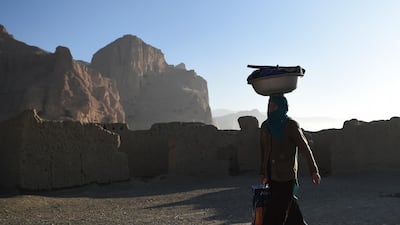Minutes after a bomb destroyed another minivan in a Hazara neighbourhood in west Kabul – the fourth in just 48 hours – Mohammad Shoaib Khiari began calling his mother.
She had gone with her two daughters to buy curtains for their new home.
He was frantic when she did not answer and began to search Kabul hospitals. He found his sister, Hosnia in critical condition with burns over 50 per cent of her body.
His mother and his sister, Mina, 23, were dead.
Three days later on June 6, Hosnia, 21, died – the latest victim in a series of attacks targeting Afghanistan’s ethnic Hazaras.
Some human rights groups are calling the many attacks a "crime against humanity". As well as being among the poorest in Afghanistan, ethnic Hazaras are also mostly Shiite Muslims, a minority in predominantly Sunni Afghanistan.
This week, when ISIS attacked de-mining NGO Halo Trust in Baghlan province, killing 10, witnesses said the attackers were looking to target Hazaras.
The charity's chief executive James Cowan said when the gunmen stormed the camp they demanded to know which team members were from the Hazara community. "When our staff refused to name them, the gunmen went from room to room murdering our staff."
After the collapse of the Taliban 20 years ago, Hazara community members began to flourish and soon advanced in various fields, including education and sports, and moved up the ladder of success.
They now fear those gains will be lost to chaos and war after the final withdrawal of American and Nato troops from Afghanistan this summer.
“People who can afford to leave Afghanistan, they leave Afghanistan, or if they cannot afford to leave Afghanistan, they stay here and wait to die,” said Qatradullah Broman, a mourner at the funeral of Mina and her mother.
A local ISIS affiliate has declared war on the Afghanistan’s minority Shiites and has claimed responsibility for many of the recent attacks. The Taliban when they last ruled were accused of massacring Hazaras, in tit-for-tat attacks that followed the killing of ethnic Pashtuns in northern Afghanistan.
In Hazara homes, suspicion even falls on the government as they wonder why perpetrators are rarely arrested, and investigations never made public.
They complain of lax security in Hazara-dominated areas even as attacks proliferate, and some recall warlords allied to the government who massacred Hazaras in previous wars.
Following last week’s bombings in western Kabul that killed Mr Khiari’s sisters and mother, a social media hashtag campaign #StopHazaraGenocide briefly trended on Twitter.
The UN Human Rights Commission has been petitioned to investigate the killing of Hazaras as genocide, or at least as a "war against humanity", said Wadood Pedram, executive director of the Kabul-based Human Rights and Eradication of Violence Organisation, which initiated the petition.
Hazaras, meanwhile, have been killed at schools, at sports clubs, even at birth.
Last year gunmen attacked a maternity hospital, also in west Kabul, killing 24 people including newborns and their mothers.
The US blamed ISIS but more than a year later no arrests have been made. Rights workers say these attacks rise to the level of war crimes.
Mr Khiari’s family believes that Afghans are tired of war and all people must work together for peace.
“We have to work to bring peace in this country, so people can enjoy their lives. At the moment everyone is living with fear, every time someone’s child leaves the home, it is hard to say if he or she will make it back alive,” said Mina’s uncle, Yusof Rajabi.
The killings are causing Hazaras, who traditionally have been non-violent, who disarmed after the Taliban fled and embraced the nation’s new-found democracy, to turn to militant leaders, some of whom have fought the Taliban and are now in the crosshairs of the government.
In some parts of west Kabul where Hazaras dominate, the rumblings have begun to sound ominous.
Talk has turned to arming Hazara youth to defend against attacks that have been increasingly vicious and often targeting the educated young.
The May 8 triple bombing of the Syed Al Shahada girls’ school that killed more than 100, nearly 80 of them Hazara students, enraged Hazaras. Some say it has been a turning point.

Sitting on the carpeted floor of the Wali Asar Mosque in west Kabul, Ghulam Reza Berati, a prominent Hazara religious leader, said Hazaras are disappointed in the democracy brought by the US-led coalition following the collapse of the Taliban.
Hazaras, who embraced the new order, have largely been excluded from positions of prominence, he said.
They were among the first to disarm after the US-led invasion in 2001, while many warlords and their groups are still heavily armed 20 years later, he says.
“When human rights, women rights, rule of law and all other internationally recognised laws are not achieved with civilisation, then we have to turn to guns,” Mr Berati said .
The presence of some of the warlords, who are powerful in the government today, remind Hazaras of the violence some perpetrated upon them and the potential dangers the future holds.








